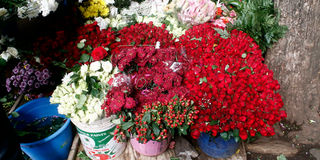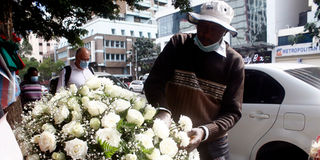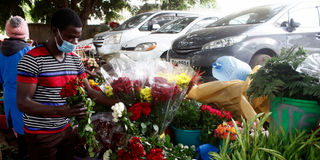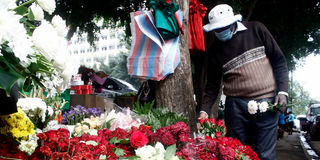Flowers and roses: Dull Valentine’s Day on the cards as Covid, harsh realities hit Kenyans

An assortment of fresh flowers for sale outside City Market on February 11, 2021. With Valentine’s Day just days away most traders are complaining of low sales from city residents.
What you need to know:
- At this time of the year, Nairobi is usually bustling with hawkers selling bouquets of roses and teddy bears bearing words of endearments.
- Lovebirds stroll the streets holding hands, gazing into each other’s eyes, while heart decorations adorn buildings, spotting the city with love.
Romance is in the air this week, but so are concerns over the Covid-19 pandemic that has so far killed more than a thousand Kenyans.
At this time of the year, Nairobi is usually bustling with hawkers selling bouquets of roses and teddy bears bearing words of endearments. Lovebirds stroll the streets holding hands, gazing into each other’s eyes, while heart decorations adorn buildings, spotting the city with love.
Valentine’s Day, celebrated every February 14, is a time for lovers to show each other affection in a special way. Women always expect romantic gestures from their partners – gifts, flowers and the sorts – which puts pressure on men. Well, not this time. Men are safe, thanks to the most unlikely situation: Pandemic.
Instead of the usual funfair and noisy beckoning from hawkers, the streets are silent with just an occasional vendor at a strategic corner, selling mitumba (second-hand clothes) and shoes.

A flower trader arranges his stock of fresh flowers outside City Market on February 11, 2021. With Valentine’s Day just days away most traders are complaining of low sales from city residents.
Valentine’s Day plans
The virus may have changed most people’s typical Valentine’s Day plans. With the restrictions put in place to contain the pandemic, massive job losses and a struggling economy, it’s tough for lovebirds out there.
“Things are different this year. By this time, the town would have been painted red from all the different gifts from red roses, gift cards and any other thing that has the colour red in it. The Kenya National Archives area has many hawkers because of the high human traffic at any given time,” said Kimani Mutegi, a hawker at Tom Mboya Street.
Naomi Ndung’u, a florist at City Market, also lamented the low business this year. The flower section, which is usually busy with money exchanging hands, is dotted with vendors wearing gloomy faces.
“We would have started making huge sales from as early as last week to companies and organisations. But I haven’t received any orders, with just days to go,” said Ms Ndung’u.

A flower trader arranges his stock of fresh flowers outside City Market on February 11, 2021. With Valentine’s Day just days away most traders are complaining of low sales from city residents.
Tough relationships
“People pass by to make enquiries about flowers but that is just it. By this time last year, I had already received more than 100 orders for different flower arrangements,” she added.
Relationship and sex therapist Maurice Matheka says that Valentine’s Day is losing its oomph and allure, isn’t surprising.
“Relationships were already tough even before the pandemic. People are now concerned about more important things like putting food on the table for their families,” said Mr Matheka.
The harsh economic times have changed perceptions about the day.

A flower trader arranges his stock of fresh flowers outside City Market on February 11, 2021. With Valentine’s Day just days away most traders are complaining of low sales from city residents.
Spending time together
“People are tightening their belts; from the poor to the rich, spending is minimal. The money that was used to either buy gifts or treat your wife or girlfriend to a day of pampering is something that does not make sense anymore. The pandemic has taught people to be selfish,” he said.
Most couples, he added, have now realised whether or not they are compatible to each other. This is because of the dusk-to-dawn curfew, which resulted in them spending more time together rather than the few hours they were used to.
“Previously, people could tolerate a lot of things in a relationship but that is not the case anymore. Now we are all trying to survive a pandemic. Therefore, you realise that you do not have to put up with negativity and baggage in a relationship,” said Mr Matheka.





